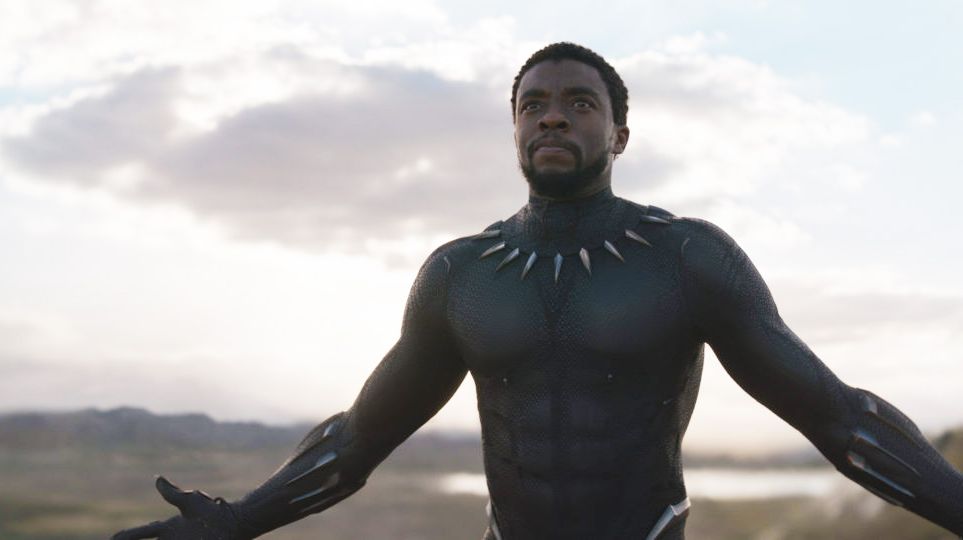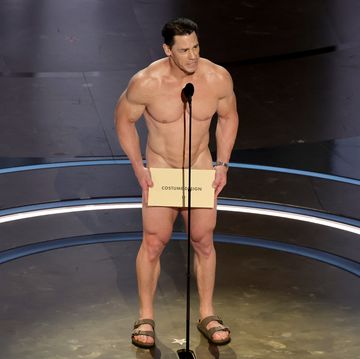I was hoping Black Panther would be a movie exactly for people like me: viewers who may not be deep in the weeds of the Marvel Cinematic Universe, but who are interested in this character and stories of the Black fantastic. And in many ways it was, even though I don’t know much about comics and I find the idea of a single “superhero” sent to save the dumb masses from themselves politically off putting. Black Panther is a Ryan Coogler movie, and I love Ryan Coogler movies, especially for the beautiful ways he portrays Black male tenderness on and off-screen.
Black Panther is also a work of Afrofuturism—the multi-genre approach for engaging the positive possibilities of technology for Black people across time and space in art, music, and science—and I love Afrofuturism. As a bonus, the movie was full of ripped, shirtless Black men in water, something I never mind.
Still, as much as I enjoyed being in its cosmos visually, and as warmly as I felt Wakanda welcomed me, Black Panther ultimately left me feeling cool by its end. This was largely because I couldn’t get myself to root against its antagonist, Erik Killmonger (Michael B. Jordan) and because I found its ending political message far more conservative than the revolutionary possibilities teased by anything with “Black” and “Panther” in the title.
But then again, as in considering the legacy of Barack Obama’s politics through the brush strokes of Kehinde Wiley—whose presidential portrait of an African American warrior was unveiled just days before Black Panther was released—it’s quite appropriate to have a nuanced opinion of Black Panther’s politics while also celebrating the unabashed joy of seeing Black audiences witness Black life depicted through Black eyes.
Black Panther’s cast and crew were adept at beautifully creating three different worlds we don’t typically see in Hollywood cinema. First, there was its animated, astronomical African origin story, devoid of any white Adam or Eve. Next, there was Oakland, California, lovingly portrayed with as much pathos as when Coogler recreated it during the last 24 hours of Oscar Grant’s life in Fruitvale Station. Finally, there was Wakanda itself: an African nation which is the wealthiest in resources and most advanced technology on earth because it was never robbed by colonialism.
It was during the scene in which T’Challa (Chadwick Boseman) is set to take over the kingdom from his late father and roams through the vibrant, bustling streets of Wakanda that I started to consider the notion that Black Panther is Star Wars for Black people. It’s as wondrous scene and as teeming with colourful life as the cantina in Star Wars: A New Hope or the Imperial Senate in The Phantom Menace—but all the characters are Black humans.
Of course, many Black people (including me) love Star Wars and, since Billy Dee Williams ruled Cloud City in The Empire Strikes Back in 1980, there has been about one Black person in each Star Wars movie (including Black Panther co-stars Forest Whitaker and Lupita Nyong'o.) But in Star Wars, Black characters perform a kind of “diversity” of an accepted, dominate whiteness. Mace Windu and Saw Gerrera never react to any other Black people in Star Wars—they mostly see white people, droids, and Wookies; Lando and Finn’s dreams and love interests are dependent upon white folks.
A consequence of seeing one Black character in a diverse cast sends the message that Black people ought to get as close to white people as they can—and not turn to other people of colour—if they want to develop intimacy, love, and power. This is not a problem in Black Panther, in which nearly every touch, every relationship, and every plot point exists is to build connection between Black characters.
One of most noble aims of Black Panther is how it dreams of and conceives of an intact Black body—both the intact national body of Wakanda as well the actual intact body of T’Challa in his suit. Like Luke Cage (another Black Marvel character who is impervious to bullets), the fantasy for individual and collective Black bodies to be impervious to the violence of colonialism and racism is laudable. When we are saturated in a visual culture where national Black bodies are called “shitholes” by the American president and the individual bodies of Trayvon Martin, Tamir Rice, or Sandra Bland are visualized as inevitably vulnerable, it is a beautiful thing how Coogler and company bring into a being a world where the destruction of the collective Black body is not inevitable but actually impossible.
And this brings us to the real heroes of Black Panther and Afrofuturism, who make such a vision possible: Black women. Though Wakanda seems to be a patriarchal monarchy passed down through male heirs—unless another man can beat him for the throne?—it is the women of Wakanda who get shit done. T’Challa’s suit was made by his sister, Shuri (Letitia Wright), a counterpart to Q, James Bond’s inventor colleague (though Shuri is as hilariously anti-colonialist as Q was birthed in service to his majesty’s colonialism). Fighting without T’Challa’s panther suit, Wakanda’s women are far more fierce than its men, particularly the sublime Danai Gurira as Okoye.
And it is wonderful to see Lupita Nyong'o as Nakia not in bondage as she was in 12 Years a Slave, nor hidden inside of the CGI character Maz Kanata in the recent Star Wars films. Instead, we are treated to Nyong’o in her full beauty as a mighty, intelligent warrior and, so terribly rare for a dark-skinned woman in a Hollywood film, as the love interest of the title character.
It’s fitting that Black Panther’s women are so central to its world because women have been so responsible for Afrofuturism and the ways science, science fiction, and storytelling have created space for Coogler’s vision. Marvel betting $200 million wouldn’t have been possible without sociologist Alondra Nelson’s infamous 1990’s “Afro-Futurism” listserv, novelist Octavia Butler’s Kindred, musical artist Janelle Monae’s The ArchAndroid, and astronaut Mae Jemison’s space shuttle flights.
Too often, science fiction subjugates women as superfluous to white men’s tyrannical vision of how the world ought to be. Black Panther largely succeeds by not relegating the women to the sidelines but by making them, for the most part, much more interesting than the male heroes.
Its female empowerment aside, Black Panther does reinscribe patriarchy and respectability in disappointing ways. T’Challa is supposed to take over from his father because he is a “good man” while T’Chaka’s widow, Queen Ramonda (Angela Bassett), looks on. And that brings us to how Black Panther didn’t work for me: I couldn’t bring myself to root for T’Challa—who honestly was pretty boring but was very respectable—when he was challenged by his American-bred cousin, Erik Killmonger. Killmonger is the bad boy, the violent African-American, the lost son separated from the motherland; but he, too, was searching for an intact Black body, only to be largely rejected because he didn’t come from the right lineage.
When it comes to Killmonger, Black Panther’s politics are not especially liberatory, especially since the film’s title (not to mention its Oakland bookends) evoke the revolutionary politics of Angela Davis, Huey Newton, Elaine Brown, and the Black Panther Party. While often hilariously anti-colonial in characters’ laugh lines, Black Panther’s major plot wants the audience to root for T’Challa largely because as the legitimate male son; he has a respectable blood claim to Wakanda’s throne—and what is a more colonialist ideology than upholding the divine right of kings?
How could I root against Killmonger—especially when seeing him as a kid in Oakland is so evocative of the life of Oscar Grant, whom Michael B. Jordan so lovingly portrayed in Fruitvale Station? But it’s actually another Jordan portrayal rattling inside of Killmonger that made it so hard for me to root against him: Adonis Johnson in Creed. In Black Panther, Jordan’s Killmonger is an unrespectable “illegitimate” relative who is angry about his cousin T’Challa (whose father murdered Killmonger’s dad) taking the Wakanda throne. In Creed, Jordan’s Adonis Johnson is an “illegitimate” child born from an extramarital affair of boxer Apollo Creed. When Adonis wound up in jail and his father’s widow came to bail him out, I felt that Coogler and Jordan were doing something revolutionary.
Being a brother from another mother myself who grew to have an improbable and close relationship with my father’s wife, I had never seen a relationship like ours illustrated on screen; “bastards” are usually reviled in stories, and I was as thrilled to see Coogler and Jordan make one of us the hero of Creed as I was disappointed to see the “illegitimate” Killmonger positioned as a threat to Wakanda in Black Panther.
Killmonger wants to use Wakanda’s weapons to stop the suffering of Black people globally, and we, the audience, are manipulated into rooting against this because we live in an ideology in which nonviolence is always expected of Black people no matter what. As James Baldwin wrote, “The real reason that nonviolence is considered to be a virtue in Negroes… is that white men do not want their lives, their self-image, or their property threatened.” I could not bring myself to root against Killmonger’s desire to help the Black diaspora any more than I could begrudge him wanting to take the throne of his child of the man who’d killed his father.
But most disappointing was how Killmonger was morally positioned in contrast to the white CIA agent, Everett Ross (Martin Freeman). Coogler sets up the audience to dislike Killmonger because he was made to kill many people by the U.S. military; meanwhile, after saving a Wakanda woman’s life, Ross was turned into your friendly neighborhood CIA agent. Every scar on Killmonger's hot, shirtless torso is for someone he’s taken out—including many Black people. It is Ross (while using Shuri’s technology) who actually stops Killmonger’s crew from exporting weapons from Wakanda to help Black people.
But we first see Ross trying to hustle vibranium out of Wakanda, and he is later absolved of his American sins by acting courageously throughout Black Panther’s plot while Killmonger is condemned for his. The latter inhabits a narrative that, if Black Americans could get access to weapons, they’d be as violent towards the world as white Americans have been. While the audience was positioned not to forgive American-bred violence in Killmonger, we were positioned to forgive it in Agent Ross.
The rehabilitation is also a kind of absolution of American imperialism, granting cover to how the CIA (in our Wakanda-less world) has been arming African countries and playing them against each other for decades. Meanwhile, when Killmonger chooses death over help from T’Challa and talks about the middle passage, he doesn’t speak of becoming enslaved in terms of America—but as something the African nation of Wakanda might do to him. It was painful to see Africa and an African American pitted against each other this way, while a CIA agent was redeemed.
“The really wonderful thing that happened to me when I was in space was this feeling of belonging to the entire universe,” astronaut Mae Jemison has said of being weightless for the first time. “We’re as much a part of this universe as any speck of stardust, any asteroid. We’re part of this universe.” In its capacity to create this feeling for its audience, Black Panther is a roaring Afrofuturist success. It creates a space of representation and for dreaming with a sense of weightlessness that a world mostly devoid of whiteness might have.
In the end, Black Panther worked for me as a dream as beautiful as T’Challa’s dreams of his father T’Chaka—both his longing dream of reunification with dad and his dream of patriarchal disappointment. I loved looking at and sitting in Wakanda, and I loved the way the film works as a space to debate so many ideas and dream so many possibilities through the lens of Black art.
But I could hardly cheer for T’Challa, am totally #TeamKillmonger, and would have loved to have seen any number of bolder political stands—against American imperialism, affirmative of queer Black sexuality, or challenging patriarchal dynasty—which could have matched how radical the mere act of having an all-Black world inside a Hollywood blockbuster already was.
Steven W. Thrasher is a doctoral candidate in American Studies at New York University and regularly publishes in the New York Times, The Guardian, BuzzFeed News, and The Nation. In June, he will become the inaugural Daniel H. Renberg chair in media coverage of sexual and gender minorities at Northwestern University.















